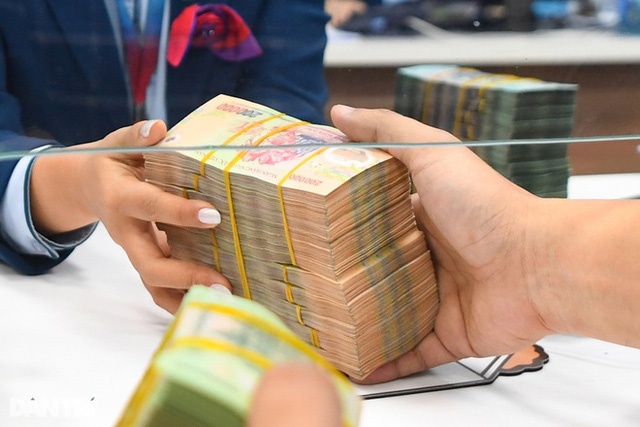Direction steady for low interest rates
 |
| Direction steady for low interest rates, Source: VTV |
Fresh data from the State Bank of Vietnam (SBV) showed that the credit growth rate for the whole system reached 3.11 per cent as of March 10, up 2 per cent on-year. Increasing capital requirements by businesses are reflected in the rapid recovery of lending in the early months of 2022.
According to the SBV, credit might grow by 5.3 per cent in Q1/2022 and by 14.1 per cent for the whole year. The rate of credit growth has increased significantly since the beginning of the year as compared to the same time last year as businesses began relaunching manufacturing and other commercial activities.
Fund management group Vietnam Holdings believed that, unlike in several developed countries where expectation of potentially sustained inflation is putting pressure on central banks to raise interest rates, Vietnamese interest rates have remained low, and more easing is expected.
“In part, inflation appears to be under greater control than in developed markets, due to lower food processing and demand, and low interest rates could be maintained going into 2022,” the group noted. “Interestingly, the VND strengthened during the period under review, and the US has removed its charges against Vietnam and several other Southeast Asian countries regarding potential currency manipulation.”
According to SSI Securities Corporation, deposit rates jumped 0.2 per cent at some major banks for a tenure of more than six months.
Deposits grew at a positive pace of 15.7 per cent during the same time, and capital mobilisation grew at a low rate of just 3.1 per cent.
“As a result of the low-interest rate environment that has prevailed for the last two years, the demand for saving deposits from the residential sector has fallen dramatically in recent months,” SSI commented. “The interest rate has reached a bottom due to rising inflationary pressures, and the rate at which it rises in the future will be determined by the economy’s recovery pace and inflation.”
Deposit interest rates are likely to rise somewhat in the second half of the year by roughly 0.2-0.25 per cent, which is expected to boost household capital mobilisation.
Bao Viet Securities Company also forecasted that the interest rate in 2022 would be difficult to reduce further. On the contrary, it could rise by 0.25-0.5 per cent.
Dinh Quang Hinh, an analyst at VNDIRECT, noted that inflation risks have prevailed. The increase in prices of input materials such as coal, steel, copper, and aluminium could impact production costs in Vietnam, while the increase in prices of fertilisers and agricultural commodities can also increase pressure on domestic food prices.
In addition, the government could reduce the prices of essential goods and services, such as electricity, tuition fees, and medical services to reduce inflationary pressure.
Although inflationary pressures are expected to increase in the coming months, Hinh still predicted that the SBV will maintain its accommodative monetary policy until at least the end of Q2/2022 to support economic recovery.
“The conflict in Ukraine is unlikely to tip the global economy into a recession. But a combination of a commodity price shock and risks of further escalation poses increasing downside risks, especially in the US and EU. The rise of inflation could weaken consumer demand in developed countries that have not yet fully recovered. In addition, supply chain disruption, increase in input material costs, and logistics costs will hurt the world manufacturing sector, especially in Europe,” he said.
As a result, the world’s major central banks, including the US Federal Reserve and the European Central Bank (ECB) face difficult choices about containing the current high inflation and supporting the economies against the negative effects of the Russian-Ukraine conflict.
“We think that the Fed and the ECB may tighten monetary policy less aggressively than expected before the conflict between Russia and Ukraine,” Hinh added.
Michele Wee, CEO of Standard Chartered Vietnam, said, “The SBV will likely stay vigilant against inflation risks, although we expect it to maintain its accommodative stance this year. We continue to expect the SBV to keep its policy rate on hold at 4 per cent in 2022 to support credit growth and manage inflation risks. Onshore credit growth in 2021 has been below the historical average. However, we now expect policy normalisation in 2023, with a 50 basis point hike to 4.5 per cent in Q4/2023.”
Wee also assessed balancing economic growth and price stability have been key challenges for Vietnam. Inflation risk could reduce the SBV’s policy flexibility as it prioritises growth over addressing rising inflation and risks to financial stability. “The pandemic is likely to keep interest rates low, pushing local investors to continue to search for yield. The imminent global shift towards monetary tightening also limits the SBV’s policy flexibility,” Wee elaborated.
What the stars mean:
★ Poor ★ ★ Promising ★★★ Good ★★★★ Very good ★★★★★ Exceptional
Related Contents
Latest News
More News
- Cashless payments hit 28 times GDP in 2025 (February 04, 2026 | 18:09)
- SSIAM and DBJ launch Japan Vietnam Capital Fund (February 04, 2026 | 15:57)
- Banks target stronger profits, credit growth in 2026 (February 04, 2026 | 15:43)
- Vietnam on path to investment-grade rating (February 03, 2026 | 13:07)
- Consumer finance sector posts sharp profit growth (February 03, 2026 | 13:05)
- Insurance market building the next chapter of protection (February 02, 2026 | 11:16)
- NAB Innovation Centre underscores Vietnam’s appeal for tech investment (January 30, 2026 | 11:16)
- Vietnam strengthens public debt management with World Bank and IMF (January 30, 2026 | 11:00)
- Corporate bond market poised for stronger growth cycle (January 28, 2026 | 17:13)
- Vietnam's IPO market on recovery trajectory (January 28, 2026 | 17:04)

 Tag:
Tag:




















 Mobile Version
Mobile Version